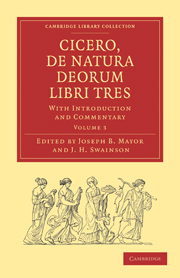INTRODUCTION
Published online by Cambridge University Press: 05 October 2010
Summary
Cicero's object in writing the De Natura Deorum was partly to complete his systematic exposition of Greek philosophy for the benefit of his countrymen; but, as theology was in his opinion the most important as well as the most difficult branch of philosophy, determining the nature and even the possibility of religion, and thus involving the very existence of morality itself, this speculative motive was reinforced by practical considerations of the most momentous character. The greater part of mankind seemed to him to be crushed under the weight of a degrading superstition, from which they could only be delivered by the propagation of more rational views on the subject of religion. A few had been driven into atheism by the recoil from superstition; but religious belief was natural to man, and the real question at issue among thinking men generally was the nature and manner of life of those Divine Beings whose existence they were compelled to acknowledge. The Epicureans boasted loudly of what they had done to set men free from the fetters of superstition, but so far as they had succeeded in doing this, it was only by abandoning the belief in a providential government of the world and reducing religion to an empty form. In fact their account of the Divine nature was so absurd that it was impossible to believe it could be seriously intended.
- Type
- Chapter
- Information
- Cicero, De Natura Deorum Libri TresWith Introduction and Commentary, pp. ix - lxxviPublisher: Cambridge University PressPrint publication year: 2010First published in: 1885



